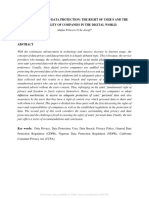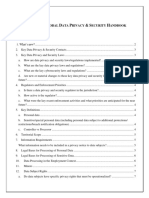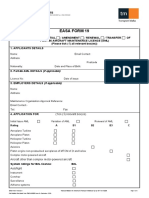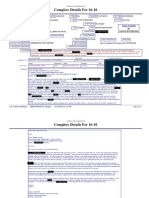0% found this document useful (0 votes)
18 views2 pagesData Privacy and Protection Laws
Data privacy laws such as GDPR and CCPA are designed to protect individuals' personal information in the digital age. GDPR applies to the EU and mandates consent-based data collection, while CCPA focuses on consumer rights in California, including the right to know and delete personal data. Organizations must comply with these regulations to mitigate legal risks and foster user trust.
Uploaded by
Tesfalem FekaduCopyright
© © All Rights Reserved
We take content rights seriously. If you suspect this is your content, claim it here.
Available Formats
Download as DOCX, PDF, TXT or read online on Scribd
0% found this document useful (0 votes)
18 views2 pagesData Privacy and Protection Laws
Data privacy laws such as GDPR and CCPA are designed to protect individuals' personal information in the digital age. GDPR applies to the EU and mandates consent-based data collection, while CCPA focuses on consumer rights in California, including the right to know and delete personal data. Organizations must comply with these regulations to mitigate legal risks and foster user trust.
Uploaded by
Tesfalem FekaduCopyright
© © All Rights Reserved
We take content rights seriously. If you suspect this is your content, claim it here.
Available Formats
Download as DOCX, PDF, TXT or read online on Scribd
/ 2


































































































